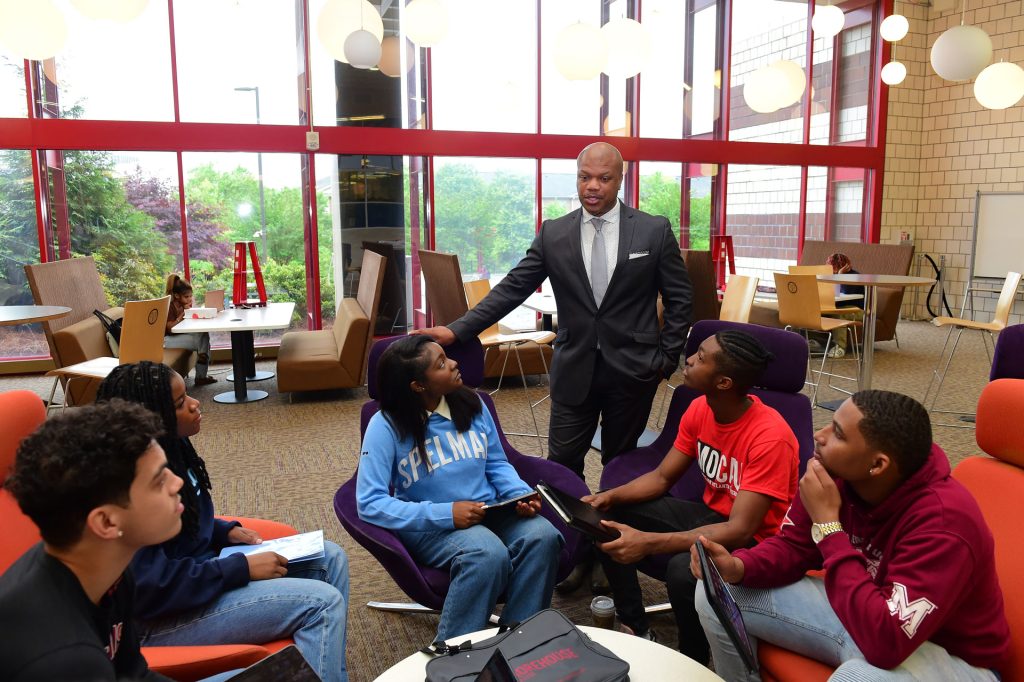Atlanta University Center Consortium
IDEA Aims To Enhance Dual Degree Engineering Education
The mission of IDEA is to increase the number of dual degree engineering program graduates from the AUC and nationally, equipping them for successful engineering careers, fostering strong engineering identities, and empowering them to make a positive impact on society and their communities.
Innovation
IDEA aims to generate new ideas useful in solving engineering problems and to promote engineering education theory and best practices.
Diversity
IDEA aims to increase diversity in engineering by promoting and developing the strengths of diverse students, particularly those attending dual degree programs at HBCUs and liberal arts institutions.
Engagement
IDEA focuses on the building of relationships, sharing experiences, and the community using engineering.
Achievement
IDEA focuses on career readiness along with providing access to tools and experiences that prepare students for the workforce.
OUR MISSION
Atlanta University Center Consortium
The mission of the Atlanta University Center Consortium is to promote collaboration and involvement among our campuses, residents, and other stakeholders in enhancing the quality of life within the neighboring community. The Consortium seeks to leverage the resources of the community and member institutions to maximize opportunities for citizens to live, learn, work, and play.
The mission of IDEA is to increase the number of dual degree engineering program graduates from the AUC and nationally, equipping them for successful engineering careers, fostering strong engineering identities, and empowering them to make a positive impact on society and their communities.
Engineering identity is the ability to view oneself as an engineer and has been linked to the academic and professional persistence of Black students. The institute will assess outcomes to ensure best practices and continual improvement.


Mita Walker
CEO, Techmax
- Solving complex problems
- We guarantee trusted service
- Experts in technology fields
WHO WE ARE
Facilitating Pathways To Engineering Through DDEP
The Atlanta University Center Consortium, Inc. has facilitated pathways to engineering for its member institutions through its Dual Degree Engineering Program (DDEP) since 1969.
In 1969, the historically Black colleges forming the AUC entered an agreement with Georgia Institute of Technology College of Engineering. At the start of the partnership with Georgia Tech, Blacks represented less than 1 percent of engineers in the American workforce. This unique partnership was formed to build academic centers of excellence for Black students to increase the number of minorities in science, technology and engineering.
AUCC Founded in
AUCC Foundational Values
- To advance our member institutions’ strategic priorities and goals
- To promote collaboration among our member institutions, surrounding neighborhoods, external partners and other stakeholders
- To demonstrate a student-centered philosophy
- To serve and advocate for community
- To honor our heritage and promote diversity
- To operate with integrity and excellence
Adding Value To The AUC & Dual Degree Engineering Efforts
To add value to the AUC and dual-degree engineering efforts, the AUCC has made the following initiatives:
In 2018
The AUCC began strengthening industry relationships and the promotion of internship and scholarship opportunities which led to over a million dollars in scholarships awarded to students last year.
In 2019
The AUCC created a summer bridge program that is inter-institutional. This program has served over 50 students and plans to begin with its third cohort in the summer of 2023.
In 2020
The consortium led an effort to engage alumni to pinpoint additional opportunities for change.
In 2021
The AUCC expanded its engineering partnerships and developed plans for new BS/MS pathways in collaboration with Georgia Tech and Michigan.
In 2022
The Consortium hired a new assistant director with engineering education expertise and announced the Institute for Dual Degree Engineering Advancement (IDEA) to focus both on operations and advancement of dual degree engineering best practices.
By 2033
The vision for IDEA is to become a leading voice nationally for dual degree engineering education.
In 2019
The AUCC began strengthening industry relationships and promoting internship and scholarship opportunities, leading to over a million dollars in scholarships awarded to students last year, led by Program Manager Dr. Christopher Ellis.
In 2019
The AUCC created a summer bridge program serving Clark Atlanta, Morehouse College and Spelman College. This program has served 144 students as of 2024.
In 2020
The consortium led an effort to engage alumni to pinpoint additional opportunities for change.
In 2021
The AUCC expanded its engineering partnerships and developed plans for new BS/MS pathways in collaboration with Georgia Tech, the University of Michigan.
In 2022
A $1.5 million investment from the A. James & Alice B. Clark Foundation, the Atlanta University Center Consortium expands its efforts to increase the number of minority engineers by creating the Institute for Dual Degree Engineering Advancement (IDEA).
In 2024
The AUCC continues to expanded its engineering partnerships and developed plans for BS/MS pathways in collaboration with Purdue University.
In 2024
Former Dual Degree Engineering Program Manager and Interim Assistant Director for Enginering Innovation, Dr. Christopher Ellis named Director of IDEA.
By 2033
The vision for IDEA is to become a leading voice nationally for dual degree engineering education.
Project Case Study
We are proud team of great project
Analytic Solutions
Accelerate innovation with world-class tech teams We’ll match you to an entire remote team of incredible freelance talent for all your software development needs..
Analytic Solutions
Accelerate innovation with world-class tech teams We’ll match you to an entire remote team of incredible freelance talent for all your software development needs..
Analytic Solutions
Accelerate innovation with world-class tech teams We’ll match you to an entire remote team of incredible freelance talent for all your software development needs..
In my current role as the Assistant Director for Engineering Innovation at the AUCC and
Director of The Institute for Dual Degree Engineering Advancement (IDEA) I often
receive the question “Why study liberal arts?” As a product of the Dual Degree
Engineering Program I too once grappled with this question as an 18-year-old college
student. The expansiveness of the liberal arts education is what drew me in as I enrolled
in the AUC as a wide-eyed and eager first year student. I wanted a college experience
that invested in me as a whole person. Courses in Black history, foreign language,
humanities, comparative politics, social science, and fine arts rounded out my in-depth
exposure to science and technology. As I reflect today, I am reminded of the quote by
Albert Einstein
The value of an education in a liberal arts college is not learning of many
facts but the training of the mind to think something that cannot be learned
from textbooks...
Dr. Jonathan E. Gaines
Assistant Director for Engineering Innovation
WHY CHOOSE US
20k+ clients love our service & IT related solution
Perfect Service

Right Agency

They Are Best

Articles & BLOG
Latest News
Our Partners













